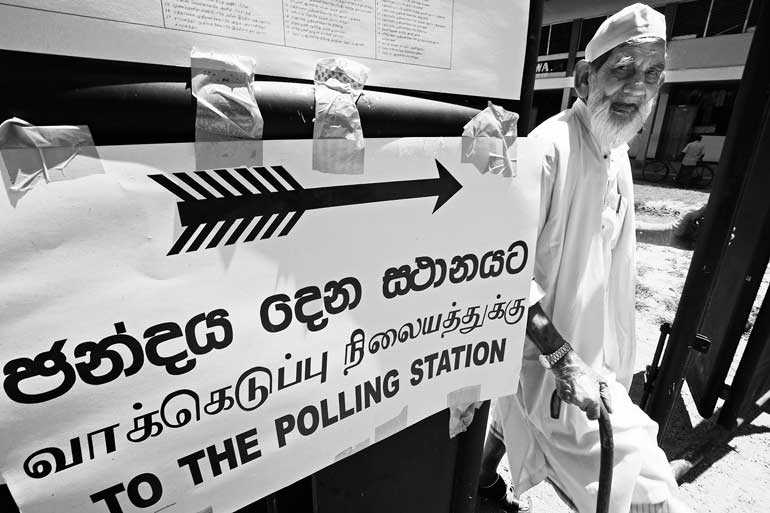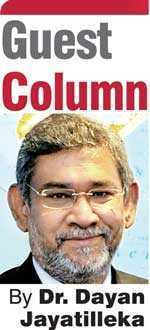Thursday Feb 19, 2026
Thursday Feb 19, 2026
Saturday, 1 December 2018 00:34 - - {{hitsCtrl.values.hits}}

An election is coming in 2019. It is constitutionally unavoidable and its timing has been decreed by the Supreme Court. It is in exactly one year i.e. it has to be held by this time next year. It is the presidential election. The only question is whether or not it will be preceded by a cleaning out of a clogged system by means of parliamentary and provincial council elections – Pic by Shehan Gunasekara
As a preface may I say that I was amused and saddened to see a young man, a self-confessed card carrying member of the UNP, a party which while in government (its current leader was a frontline Minister), was politically, morally and ethically responsible for Black July ’83, accuse me of being “racially divisive”. See Election 2019 by Dinesh Anthony Perera (http://www.ft.lk/columns/Election-2019/4-667717) published on 28 November
If so, I must be the only “racially divisive” individual elected by the UN Human Rights Council as the Chairperson-Rapporteur of the Intergovernmental Working Group on the Effective Implementation of the Durban Declaration and Programme of Action (DDPA).
The Intergovernmental Working Group on the Effective Implementation of the Durban Declaration and Programme of Action is one of the three mechanisms established to follow up the Declaration and Programme of Action of the UN World Conference against Racism, Racial Discrimination, Xenophobia and Related Intolerance.
The Intergovernmental Working Group was established by the Commission on Human Rights resolution 2002/68 and approved by the Economic and Social Council in its decision 2002/270 in 2002. Its mandate is to “Make recommendations with a view to the effective implementation of the Durban Declaration and Programme of Action and Prepare complementary international standards to strengthen and update international instruments against racism, racial discrimination, xenophobia and related intolerance in all their aspects.”
So much for me being “racially divisive”, let alone “psychopathic”—which adjective employed by the young UNPer is bitterly ironic when one recalls the Presidential Commission Report on Batalanda and the televised testimony of witnesses.
Election 2019
Now, for that which is centrally relevant to our most important current issue: Election 2019.
An election is coming in 2019—contrary to my young critic’s wish, insinuation, and implicit argumentation and plea. It is constitutionally unavoidable and its timing has been decreed by the Supreme Court. It is in exactly one year i.e. it has to be held by this time next year. It is the presidential election. The only question is whether or not it will be preceded by a cleaning out of a clogged system by means of parliamentary and provincial council elections.
If a parliamentary election and provincial council election precede the presidential, then much of the steam built up in the system would have escaped, leading either to continuity or a soft landing/soft transition at the presidential election. If however, a mid-term parliamentary election has not been held, then all the pent-up tension against the socially decadent UNP elite establishment will be released at a presidential election.
The overwhelming global trend being what it is, the inevitable swing against neo-liberalism will then take a more sharply and aggressively nationalist-populist shape, than it otherwise would. It will be militarist Far Right rather than Populist Centre-Left; Brazil rather than Mexico.
Psychological bond scam
Right now, a psychological bond scam is being pulled on us.
We are being asked to believe that we live in a Westminster system when we do not and have not, arguably since 1972 and unarguably since 1978.
We are being asked to make believe we live in a Westminster system at a time when we can see every day on our TV screens, the scenes from Westminster, of a government and a polity floundering when it isn’t tearing itself apart. In short, we are asked to follow the Westminster model when that model is showing itself to be at its most dysfunctional, and vastly inferior to that of a republic and a presidency, which is what we have.
We are told that Sri Lanka is in an unprecedented state of crisis and that this crisis can be resolved only by a reversion to the status quo ante; that which existed before 26 October. On the contrary, what we have now is exactly the kind of situation that the architect of the Constitution envisaged and planned to pre-empt or prevail over! That can happen only if the existing model, which is presidential rather than parliamentary, is allowed to function unimpeded.
Addressing the SLAAS- F Section (Social Sciences) annual session in 1966, with Dr. Lal Jayewardene in the chair, Minister J.R. Jayewardene called for a “strong and stable Executive, free from the whims and fancies of the Legislature”.
Thus the designer and framer of our Constitution expected that the Legislature would, on occasion, be carried away by its whims and fancies. He expected that this would be deleterious to the nation and its interests, especially that of stability. Therefore he argued for a strong and stable Executive, free from the whims and fancies of the Legislature.
It is only if we subject the Executive to the whims and fancies of the Legislature that the ship of State may capsize. On the other hand, if the Executive is allowed to stand strong and stable, free from the whims and fancies of the Legislature which is attempting to set itself up as a contending power centre which can override the presidency, stability is ensured and the system will function as the architect intended it.
The other psychological scam being pulled on us is the notion that the Parliament is the repository of democracy while the Executive Presidency is coterminous with tyranny. This is wholly dishonest in that the executive is directly elected—unmediated by even an electoral college, as in some countries where you can lose the popular vote but win the election!—by a majority of the people (50%+1) taken as a whole. Thus the presidency is the chief repository of popular sovereignty and democratic choice. Furthermore, this present Parliament has been distorted since one party with a mere 16 seats and another with a mere six were accorded the designation and status of the Opposition, its Leadership, and its Chief Whip respectively, on a mere technicality, thereby depriving a real mainstream national opposition several times their number, of any official role and status whatsoever. That dangerous lopsidedness is an anomaly that can be rectified only by a mid-term parliamentary election.
Finally, the mind games that are being played include patronising and interventionist injunctions to us by external players who are hardly paragons of ethics, morality or success. One is a country that not only invades and destroys states on false pretexts but is also such a sick society that hardly a month passes without some mass shooting of citizens including children by some crazy person. Before legislators and officials of such a country prescribe what we should do, it should perhaps pass legislation which protects its own children.
Yet another is a country that is tearing itself apart over Brexit, with turmoil in government and Parliament, and with constituent regions threatening to exit if Brexit (which was passed at a Referendum) goes through. Since it does not have a written Constitution one doesn’t quite know who is in charge, for how long, and what happens next. A third is a regional body which lectures us; a regional organisation from which a prominent member is trying to get the hell out of, and is finding it a lacerating business to do so.
While we are being publicly criticised, lectured to, instructed and implicitly threatened by countries that are overstretched and in slow, parabolic, relative historical decline as befalls all empires and their satellites; decadent hegemonic powers struggling against the birth of a multi-polar world, Sri Lanka is, by contrast, not being lectured to by the world’s and the region’s most successful rising power, whose support we enjoy.
A successful state
The worst scam that is being pulled on us is the notion that we are somehow an unsuccessful state and country. This is nonsense. We have preserved our territorial unity and integrity despite a 30-year secessionist war, and by prevailing decisively over the enemy. Many countries, including in Europe have not. We have seen off an external force on our soil. Many countries still have foreign forces and bases on their soil. We have defeated a powerful globalised terrorist army. Even the world’s only superpower has failed to do so. We have always preserved our democracy and fought off two southern/Sinhala insurgencies to do so. Many countries have had long periods or at least episodes of dictatorship. We have preserved a basic system of social welfare. The world’s leading power still does not have free health care or free education. We have a Republic with a written Constitution, not an archaic monarchy. We have a Presidential system, which four of the five members of the UN Security Council have.
In sum, we have a successful state which has warded off many challenges which others have failed to overcome. We should be proud of ourselves and preserve our victories. Next year, 2019, around this time, we have elections—our most important one—whether anyone likes it or not. That is the presidential election.
What we must remember it is that 2009 is the 10th anniversary of our great patriotic victory over terrorism, or more accurately terrorist-separatism. We must preserve the political system that enabled us to win this great victory. In the 10th anniversary year of this victory we must have a government and a PM that will celebrate it; a government and PM that are consistent with the ideas and spirit of that great achievement—not those who tried, twice, to sell us out in the spirit of appeasement associated with Munich and Chamberlain.